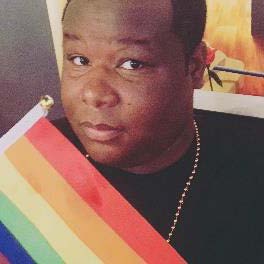06.21.21
Serving LGBTQ+ Youth Today
 June is Pride Month, when we celebrate the resilience and triumphs of lesbian, gay, bisexual, transgender, and queer individuals, as well as recognize and support the ongoing work to raise their voices and advance their rights. We asked Shaquille Jones of the Family Networks program in Riverside’s Child & Family Services Division about his experiences working with LGBTQ+ youth, and more specifically about LGBTQ+ youth in the BIPOC (Black, indigenous, and people of color) community.
June is Pride Month, when we celebrate the resilience and triumphs of lesbian, gay, bisexual, transgender, and queer individuals, as well as recognize and support the ongoing work to raise their voices and advance their rights. We asked Shaquille Jones of the Family Networks program in Riverside’s Child & Family Services Division about his experiences working with LGBTQ+ youth, and more specifically about LGBTQ+ youth in the BIPOC (Black, indigenous, and people of color) community.
Q. How does working with LGBTQ+ youth differ from working with adults?
A. Often with adults, we find they need to come to terms with the trauma they experienced when younger – how it affects their current relationships, their ability to set appropriate boundaries, or even dealing with internalized homophobia. When working with youth, who may be experiencing trauma, isolation, discrimination, or fear, you can work through it and help them heal in the present moment. Some could argue that today’s youth have an easier time, with access to social media easing the way to finding their community, whether local or international. Each youth’s path is different, and I love to work with LGBTQ+ youth as they work to define their own identity.
Q. What are the different issues faced by BIPOC youth in the LGBTQ+ community?
A. There are many – sexual exploitation and violence, often inflamed by social media, and the fetishizing of young males and trans females of color. I highlight this not to minimize the violence perpetrated against others of the community – however, these youth must navigate not only the blatant discrimination and erasure faced daily by the trans community, but also a world that may feel threatened by them due to the color of their skin.
Q. How does your experience as an LGBTQ+ person inform your work with youth? With others?
A. I do feel that my experience as an LGBTQ+ individual and as a BIPOC gives me unique insight and a deeper understanding of the youth that I work with and advocate for. I can bring a level of cultural awareness that my white counterpart might not. I am a visual representation that the barriers facing POC and the LGBTQ+ community can be overcome. Society’s perceptions of who we are can be irrelevant, and we can blaze our own paths.
Q. Is it easier or harder for youth to be part of the LGBTQ+ community today than when you were a teen?
A. I would say in some ways it is more manageable today. The LGBTQ+ community is a lot more visible now, especially for those around age 14-21, than it was when I was a teen. With cultural phenomena such as RuPaul’s Drag Race, Tik Tok creators, and mainstream celebrities challenging gender norms, it is easier now to foster a sense of community for most LGBTQ+ youth. But as noted before, each youth’s experience is different.
Q. What are the key ways you see to advance the cause of LGBTQ+ youth?
A. The three keys to advancing the cause of LGBTQ+ youth are representation, resources, and education. I’m a huge advocate of representation, especially working in human services and mental health. A significant part of our work is building trust and fostering a connection of some kind with the individuals we support; having clinicians and staff that look like and are a part of those communities really helps.
In terms of resources, we need more funding to support the needs of young adults, especially those who identify as BIPOC and LGBTQ+; more residential programs to create safe spaces, some of those specific to LGBTQ+ youth who have experienced intense trauma. As a society we should be respecting the work and raising pay for clinical and residential staff, so those who support youth can stay in the field and make a decent living.
And as we begin to understand more about the fluidity of gender and sexuality spectrums, we’ll need to provide education on the issues our clients face in the real world…information on the importance of a preferred name or gender pronouns…how to create safety plans to support homeless trans youth. I could go on, but I’ll simply stress the importance of educating ourselves on the barriers that LGBTQ+ and BIPOC youth face – those must be understood so we can work on progress.
Q. Any other thoughts you’d like to share?
A. First and foremost – I love the work that I do! I enjoy being there as an advocate for those who want to find their voice, as well as witnessing the personal growth in the youth I support. I look forward to coming to work and knowing I am helping to advance the cause and enhance the lives of LGBT/BIPOC youth in our communities.
Family Networks is Riverside’s coordination service for the Massachusetts Department of Children and Families (DCF). We work with families in Cambridge, Somerville, Burlington, Wilmington, Woburn, and Winchester by coordinating the most appropriate services for youth experiencing serious emotional disturbances. This network helps children, who might otherwise be placed in residential care, to be treated and supported within their own communities.
